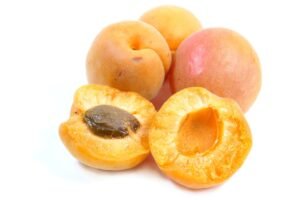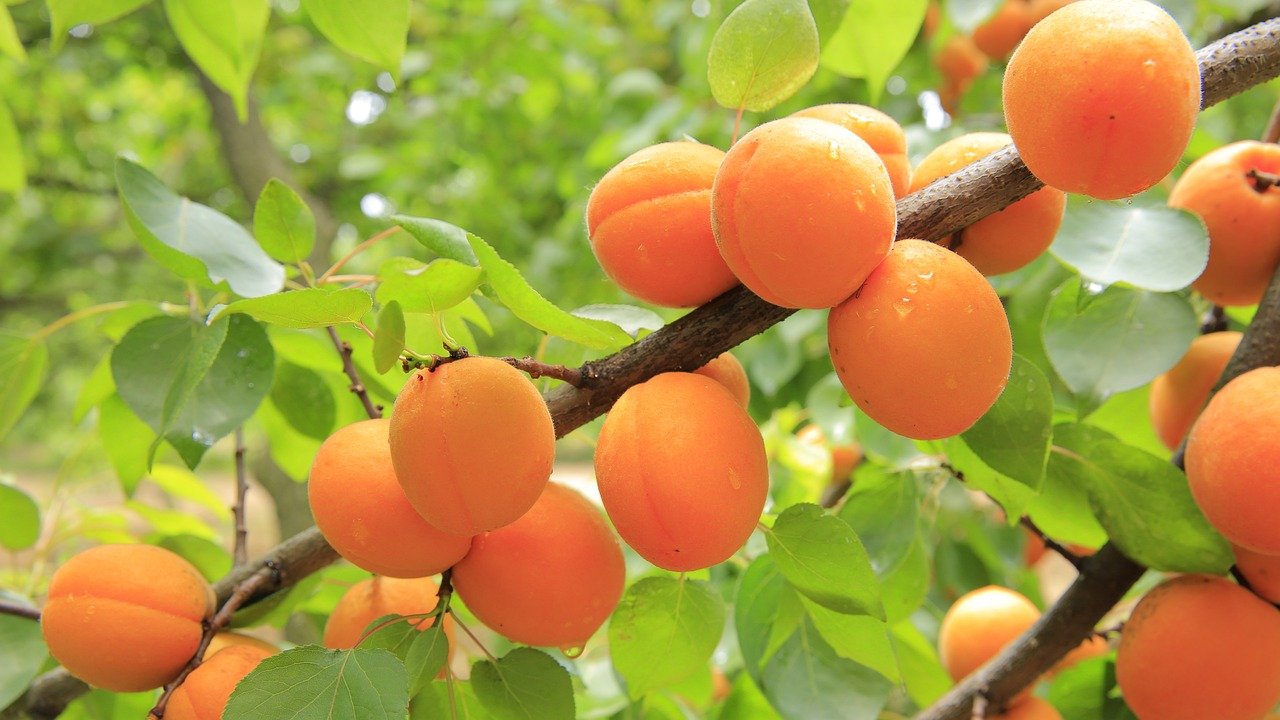Introduction
Apricots, also known as “the golden egg of the sun,” are a crucial fruit crop in dry temperate regions, originating from China and some indigenous to India. They thrive in Mediterranean climates, preferring well-drained, deep, and fertile soil with an alkaline pH. They can survive temperatures as low as 7°C but are sensitive to spring frost.
Apricots are a member of the Rosaceae family and genus Prunus, growing on deciduous trees. They have oval leaves, dark green with yellow undersides. The fruit, a drupe, is 3-5 cm wide and can grow up to 8 cm. The fruit’s surface is yellow or reddish-orange, smooth or velvety, and has a ridge. The fruit’s stone is a 1.5 cm wide single seed and a hard shell.

Nutritional Composition
Apricots are a rich source of carbohydrates and also have a good content of minerals, vitamins, and fibers. In addition to these, they also contain phytochemicals i.e. polyphenols and carotenoids.

Carbohydrates
A fresh apricot contains 10-13 percent carbohydrate content. However, the total sugar in the fruit is 9g/100g of apricot’s weight. Glucose, sucrose, sorbitol, and fructose are present with sucrose being the dominant one.
Protein
Apricot contains 1.5% nitrogenous compounds, with 75% protein, accounting for 0.67% of the fruit’s protein content. Aspartic and glutamic acids are predominant amino acids, with sulphur-containing ones in trace amounts.
Organic Acid
Apricots contain malic, citric, lactic, oxalic, fumaric, and glyceric acids, which maintain stomach acid-base balance and increase iron bioavailability.
Lipids
Apricot is low in fat, comprising 0.4 g/100 g of fruit weight.
Fibers
Apricots contain 11.5% fiber, with pectin, pentosane, cellulose, and hemicellulose making up over 70% of the total fiber content.
Vitamins
Apricots are good sources of vitamin B12, vitamin B3, and vitamin B9. They also contain vitamins A, E, C, and K.
Minerals
Apricots contain calcium, magnesium, selenium, potassium, and phosphorus.
Phytonutrients
Apricot is a rich source of carotenoids, antioxidants that protect cells from oxidative damage. β-carotene, the predominant carotene, makes up about 50% of the fruit’s total carotene content. Polyphenols, secondary metabolites produced by plants, impart flavor to the fruit and are responsible for the musky fruit aroma.
Health Benefits
Antioxidant activity
Apricot’s rich phenolic composition protects cells and tissues from oxidative damage, which causes the generation of reactive oxygen species (ROS) and disrupts DNA, protein, and lipid structure. The phenolics act as reducing agents, removing free radicals and blocking ROS attacks on tissues and organs. Caffeic acid also acts as an iron chelator, flushing out excess iron.

Anti-cancerous activity
Apricot is a potent anticarcinogen. Amygdalin (Vitamin B17) content in the fruit has a chemopreventive effect.
Ophthalmic health
Apricots, rich in zeaxanthin, help prevent eyesight loss.
Reduce Cardiovascular disease and associated risks
Antioxidants, such as vitamin C and flavonoids, protect lipids from oxidation, reducing the risk of coronary heart disease. They also inhibit cell to cell adhesion factors formation, preventing blood clot formation.. Flavonoids also affect plasma coagulation and fibrinolysis factors, which play a role in controlling thrombus formation in atherosclerotic coronary arteries.
Apricots have a cardioprotective effect due to their dietary fiber content, which binds cholesterol, blocks accumulation on artery walls, and increases LDL cholesterol clearance. Potassium in apricots also regulates water levels both intracellularly and extracellulary, lowering blood pressure
Hepatic steatosis (Fatty liver disease)
.Apricot is effective in treating hepatic steatosis in humans, with its vitamins, carotenoids, and flavonoids providing protection against hepatotoxicity.
Haemostasis
Flavonoids and flavones are linked to a reduced risk of cardiovascular disease due to their effect on haemostasis.
Conclusion
Apricot has rich nutritional composition with abundant health benefits. The consumption of apricot reduces the risk of cardiovascular diseases and also provide protection against hepatotoxicity. It also possess anti cancerous activity. Thus, apricot play an important role in maintaining human health.

